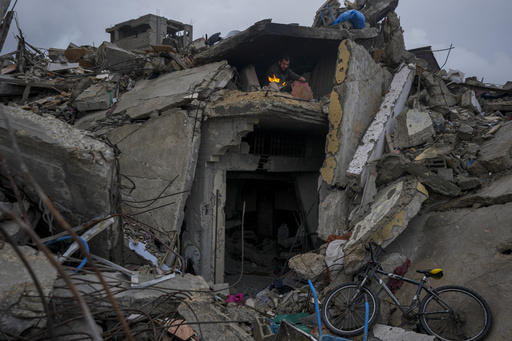Israel’s defense minister has announced that he has directed military officials to devise strategies for a significant number of Palestinians to exit the Gaza Strip, following a proposal put forth by President Donald Trump regarding the future of the war-torn region.
Minister Israel Katz conveyed on Thursday that the evacuation plan would encompass land border crossings as well as specialized arrangements for maritime and aerial departures, expressing support for Trump’s “ambitious initiative” designed to facilitate the relocation of the Gazan population to various destinations worldwide.
Katz refrained from speculating about the possibility of Palestinian return to Gaza, a location that has suffered extensive devastation following Israel’s prolonged military operations against Hamas, lasting over 15 months.
Currently, there are no visible preparations for such exodus measures, and Katz provided no specifics on how the military would support the planned evacuations.
Trump recently suggested that the majority of Gaza’s residents should be resettled “permanently” elsewhere while the U.S. commits to rebuilding the ravaged territory. However, Palestinians have universally expressed their unwillingness to leave, dismissing Trump’s plan. The Palestinians, alongside many in the international community, have denounced the proposal as infringing upon their rights, with various human rights organizations decrying it as a form of involuntary relocation that contravenes international law.
U.S. officials later clarified that the relocations would be designed to be temporary; nonetheless, there are concerns among Palestinians that Israel might indefinitely prohibit their return, exacerbating an enduring refugee crisis that has its origins in the establishment of the state of Israel.
In ongoing developments, displaced Palestinians are facing another harsh winter amidst cold and wet conditions after a ceasefire took effect two weeks ago. Frigid winds have damaged makeshift shelters in the Gaza Strip, leaving hundreds of thousands without homes, even as many individuals returned to northern Gaza last month following the truce.
Temperatures have plummeted to a low of 8 degrees Celsius (46 degrees Fahrenheit) during the night.
Additionally, an Israeli military court has sentenced a reserve soldier to seven months in prison due to his involvement in the abuse of Palestinian detainees at a facility notorious for such violations. This soldier, while performing his duties at the Sde Teiman facility, was found guilty of physically assaulting detainees who were handcuffed and blindfolded, with these actions occurring in front of fellow soldiers and even recorded on his personal cellphone.
This facility has been a point of contention, especially during the ongoing conflict, with escalating scrutiny over Israel’s treatment of Palestinian prisoners.
Amidst this situation, a shocking case earlier this year saw the arrest of ten soldiers for their alleged role in the sexual assault of a detainee, leading to widespread protests advocating for the soldiers’ release.
Human rights organizations have reported severe mistreatment and deplorable conditions at the Sde Teiman detention center, prompting a legal bid to close it down, resulting in a partial transfer of detainees and promises of facility improvements.
On another front, Trump recently stated that his plan for U.S. involvement in Gaza’s redevelopment would not require American soldiers. He suggested that Israel would yield control of the Gaza Strip to the U.S. once hostilities conclude, and he envisions that Palestinians could be relocated to “safer and more beautiful” areas with modern residential options.
Trump’s remarks came shortly after he unveiled a controversial plan to relocate residents of Gaza, drawing backlash from multiple quarters, including American allies and even members within his political party.
In a stark warning, Human Rights Watch has flagged that such relocation efforts, if enforced, could be interpreted as ethnic cleansing, as this initiative might involve systematic displacement of an entire civilian population based on ethnicity.
In the face of Trump’s plans, Palestinian advocates have conducted protests to underscore their desire to remain in their homeland, highlighting the resistance against forced relocation.
As global reactions unfold, countries like Pakistan have voiced their discontent over the proposal, labeling it as unjust and a violation of international standards. Islamabad emphasizes that international resolutions dictate the establishment of a Palestinian state, insisting on the necessity of restoring all displaced individuals to their respective homes.
Meanwhile, Egyptian officials are actively engaging in diplomatic maneuvers to counteract Trump’s proposals, fearing that the push for mass relocation could jeopardize Egypt’s long-standing peace treaty with Israel, an essential component of regional stability.
They have expressed their concerns to both the United States and European allies about the potential threats this announcement presents to Egypt’s national security.
Lastly, amidst all this, Israeli military authorities reported the tragic deaths of two soldiers due to an accidental crane collapse in Gaza, marking the first Israeli military fatalities since the ceasefire agreement was established.
This event underscores the precarious nature of the situation in the region, as discussions surrounding hostages held by Hamas and further negotiations for peace continue to evolve.




